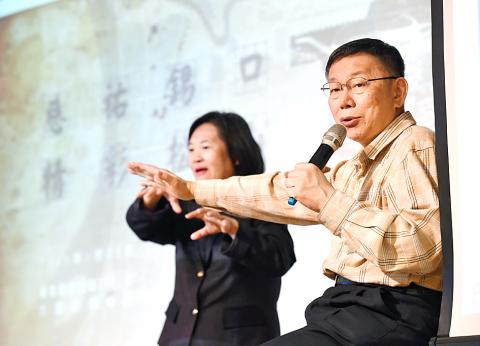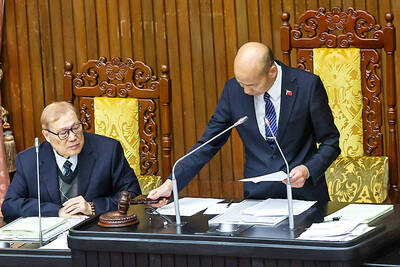Taipei Mayor Ko Wen-je (柯文哲) yesterday said he would like to know what President Tsai Ing-wen (蔡英文) meant by “Taiwanese values,” after she said that he should reaffirm his commitment to such values to gain the support of Democratic Progressive Party (DPP) members.
Tsai made the remark in an interview with political talk show host Cheng Hung-yi (鄭弘儀) on Monday when she was asked whether the DPP still views Ko as an ally, as the party had supported him in the 2014 Taipei mayoral election.
Ko made some remarks and did some things that made DPP supporters uncomfortable, Tsai said, adding that the mayor is a smart person, so if he wants the support of DPP voters, he should know what they expect of him.

Photo: Fang Pin-chao, Taipei Times
He should reaffirm his commitment to “Taiwanese values” so that DPP supporters “can feel that he is someone with whom we can fight together,” Tsai said.
“I would like to know what Taiwanese values mean,” Ko said when asked what he thought Tsai meant.
“Within the Chinese community in east Asia, what makes Taiwan special is its democracy, freedom, diversity and openness. While there is room for improvement in its rule of law, human rights and environmental protection, the realization of these universal values should be Taiwan’s values,” he said.
“I think politics should be realized in the people’s daily lives, so making idealistic and unpractical remarks is useless,” he said, adding that as an example, people want affordable, good quality apartments to rent.
“I know the levels of thinking of the president and the mayor are not the same — the president has to deal with national defense, diplomacy and ideological issues, but the mayor does not,” Ko said. “The mayor only has to care about economic development and try to let people live happy lives.”
“Society is not very accepting of criticism and I was only speaking the truth,” Ko said, when asked why he made DPP supporters uncomfortable.
Even though he could speak less, he cannot keep things to himself, Ko said.
Former DPP legislator Lin Cho-shui (林濁水), a senior party member, yesterday wrote on Facebook that while the president mentioned that there are many definitions of “Taiwanese values,” she should share her point of view and the nation’s perspective, so that everyone can use them to evaluate Ko.
DPP legislators Pasuya Yao (姚文智) and Tuan Yi-kang (段宜康) have criticized Ko’s perception of Taiwanese values as being overly China-friendly and authoritarian.
Yao, who has announced his candidacy for the Taipei mayoral seat, said Ko’s descriptions of cross-strait relations as “one family” and a “quarreling couple” during a visit to Shanghai in July last year “deviated from Taiwanese values” and made DPP supporters “feel uneasy.”
Ko’s values differ dramatically from those of the DPP, and one might question whether he would hold the Nazis and Adolf Hitler in high regard with his authoritarian mindset, Tuan said.
Taiwan and China are not a family, and close cross-strait ties can be developed, but not forced, Tuan said.
“Efficiency in building an authoritarian rule cannot be used to gloss over the victimization of the people,” Tuan said, referring to Ko’s seeming admiration for former president Chiang Ching-kuo (蔣經國).

DEFENDING DEMOCRACY: Taiwan shares the same values as those that fought in WWII, and nations must unite to halt the expansion of a new authoritarian bloc, Lai said The government yesterday held a commemoration ceremony for Victory in Europe (V-E) Day, joining the rest of the world for the first time to mark the anniversary of the end of World War II in Europe. Taiwan honoring V-E Day signifies “our growing connections with the international community,” President William Lai (賴清德) said at a reception in Taipei on the 80th anniversary of V-E Day. One of the major lessons of World War II is that “authoritarianism and aggression lead only to slaughter, tragedy and greater inequality,” Lai said. Even more importantly, the war also taught people that “those who cherish peace cannot

STEADFAST FRIEND: The bills encourage increased Taiwan-US engagement and address China’s distortion of UN Resolution 2758 to isolate Taiwan internationally The Presidential Office yesterday thanked the US House of Representatives for unanimously passing two Taiwan-related bills highlighting its solid support for Taiwan’s democracy and global participation, and for deepening bilateral relations. One of the bills, the Taiwan Assurance Implementation Act, requires the US Department of State to periodically review its guidelines for engagement with Taiwan, and report to the US Congress on the guidelines and plans to lift self-imposed limitations on US-Taiwan engagement. The other bill is the Taiwan International Solidarity Act, which clarifies that UN Resolution 2758 does not address the issue of the representation of Taiwan or its people in

The Philippines yesterday criticized a “high-risk” maneuver by a Chinese vessel near the disputed Scarborough Shoal (Huangyan Island, 黃岩島) in a rare incident involving warships from the two navies. The Scarborough Shoal — a triangular chain of reefs and rocks in the contested South China Sea — has been a flash point between the countries since China seized it from the Philippines in 2012. Taiwan also claims the shoal. Monday’s encounter took place approximately 11.8 nautical miles (22km) southeast” of the Scarborough Shoal, the Philippine military said, during ongoing US-Philippine military exercises that Beijing has criticized as destabilizing. “The Chinese frigate BN 554 was

LEISURE: The new law adds Confucius’ birthday, the anniversary of the Battle of Guningtou, Constitution Day and Little New Year as national holidays The Legislative Yuan yesterday passed new legislation adding four national holidays and making Workers’ Day a national holiday for all sectors. The Chinese Nationalist Party (KMT) and the Taiwan People’s Party used their combined majority in the legislature to push the jointly proposed draft through its third and final reading. This new law supersedes the existing regulations for the implementation of memorial days and state holidays, which are administered by the Ministry of the Interior. The new law recognizes Confucius’ birthday on Sept. 28, the anniversary of the Battle of Guningtou on Oct. 25, Constitution Day on Dec. 25 and “Little New Year,”